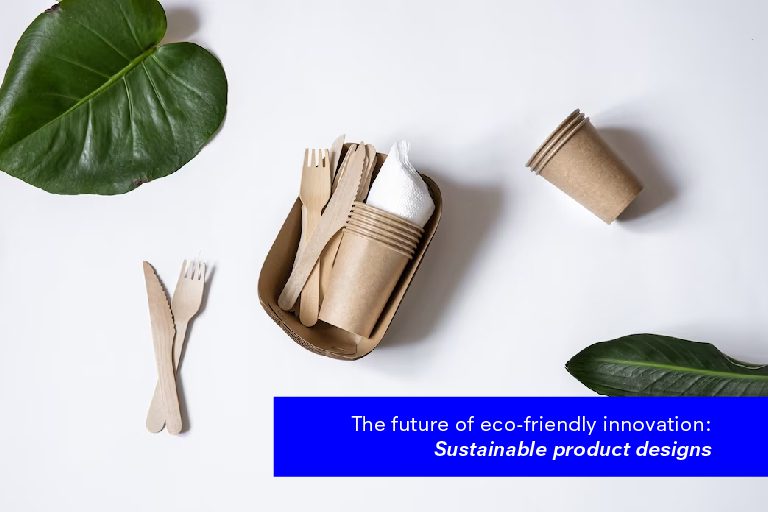Ever wonder how much waste each individual produces with their daily consumption needs of disposable coffee cups, water bottles, food and beverage containers, wrappers, tissue paper, and the list goes on. Now multiply these daily consumables with close to 8 billion people and imagine the waste produced. Many countries have banned single use plastic and encourage the growing sector of recycling start-ups, however, there is a lot yet to be achieved. This is where product designers can help solve the problem.
The shift from user-centricity to human centric design has become the need of the hour. Shifting away from purely profit-driven design with harmful carbon emissions to sustainable product design carries great potential for positive environmental and social effects. Aspiring designers are now urged to adopt a future-oriented, human-centric perspective during their learning years.
When it comes to sustainable product design, designers must research their design choices. They should seek options that effectively reduce social and environmental impacts at every step in the product’s lifecycle. Consider raw materials, production cycle details, transportation to the end user or stores, customer uses and the dispose-off phase – the waste phase. Sustainable design is defined as one that maximizes environmental, social, and economic benefits of a product.
Also read: Graphic Design trends dominating 2023 so far
Here are a few brands that are working to make some of our daily consumables with eco-friendly materials or helping solve the problem of waste:
a. Biodegradable toilet paper
By designer, Aviva Revivi, an industrial design student, this biodegradable toilet paper is named by the designer as ‘O-SOW’. Made using plant seeds, orange, and aloe vera leaves – this product promotes plant growth. So next time you are planning a trip or a hike, you can now sow and fertilize the earth without having to worry about leaving behind waste.
She (the designer) says that ‘Seeds of different plants are woven into O-SOW and with the help of the nutrient-rich human waste, natural seeding occurs simply through its use. The seeds I used are mint, peony, rose, parsley, and cress, but I aim to map popular trekking areas and assign each a number of seeds suitable for growing.’
She picked a round shape for the toilet paper from her research as she found it has enough length and width for dual wiping and is adequate for all most human sizes. “When choosing the shape, it was important for me that there would be a double response option that would be product-oriented and look pleasant and promising but renewable and supporting the product values,” she said to Yankoo design.
Also read: Sustainable branding: Building green identities for ethical businesses
b. Bio-tool tester for water contamination
Melissa Ortiz, the designer, artist, and former high-school teacher recently designed ‘Colores del Rio’- a bio-tool that is designed to check if water is contaminated. This uber cool product name ‘Colores del Rio’ translates to colours of the river and is an ingenious tool that is created using red cabbage waste that she has sourced from local agricultural community. Red cabbage is used for its unique properties as it changes colour when it comes in contact with acidic water or alkaline water.
The product has also won ‘Outstanding social critique’ award at the Biodesign Challenge 2023.
Colores del Rio is designed to function as a bioregional engagement tool and would offer great aid to farming communities in certain areas of California. Encouraging them to dig deeper into the food systems.
Melissa told Yankoo design in her interview that “This community engagement tool is Biodesign-activism in response to local systemic issues involving the monoculture industry, the Salinas River watershed, and impacted communities. Colores del Rio combines community engagement and a human-environment relationship through citizen science.”
Also read: Sustainable branding: Building green identities for ethical businesses
c. Eco-friendly coffee packaging
Designed by Alex Philpott from Beta Design Office, Earthmade Aromabox is a home-compostable, eco-friendly packaging design ready and set to revolutionize the coffee industry and offer it a great push towards sustainability.
Taking care of the disposing issues of packaging, Earthmade Aromabox is visually appealing product design with a much-needed twist of environmental consciousness. The packaging is created using beans and grounds. It is then further crafted with Bamboo-O, a material made from bamboo fibre and plant starch. The result is a packaging that contains no plastic and is entirely natural. Designed with extensive research this packaging design helps to preserve the freshness of the coffee and commits to sustainability.
d. Terracotta coolers to offer Air-conditioning a natural and sustainable makeover
Designed by Simon Pavy and global design agency – Entreautre, 3D printed Terracotta cooler is offering an innovative and needed solution to replace AC’s significant carbon footprint. Taking in inspiration from ancient practices of India regions, Middle East and other Asian communities, Simon Pavy has designed the natural AC with a Water Evaporative Evaporator Effect. Allowing airflow to come in contact with the wet surface of the terracotta, the water undergoes a natural evaporation process, producing a fresh flow of cold air, Yanko design blog reports.
As we face climate change and global melting, the demand for air-conditioners is on the rise and a sustainable solution using all natural materials is the disruption our planet needs.
Also read: AI’s influence in UX Design: Redefining UX design
e. Home compost bin
In our kitchen, office spaces, and homes, we generate a significant amount of daily waste. What if there were a compost bin available to help you compost this waste easily and without odours? You could then use the compost to help your indoor plants thrive.
Designer Alp Cakin has addressed the issue of home waste with innovative product design of Homepost – a composting station for your office or home. It’s a composting station uniquely designed to prevent any odour and quickly produce a nutrient rich compost at home to grow fruits, vegetables or for indoor plants growth. Offering composting for a wide range of organic waste – you can compost your biodegradable plastics, paper waste, nutshells, teabags, coffee grounds, fruits, eggshells, and vegetable scraps – transforming all this into a nutrient rich compost for your plants and gardening.
The Homepost features a built-in knife for finely chopping waste. It comes with an active carbon filter to eliminate unpleasant odours. Additionally, it offers an extra compost tank with an 8.5-liter capacity for added storage. The product itself is designed and build with environment friendly materials like green polyethylene that is made from Brazilian sugarcane.
Many designers and start-ups are creating eco-friendly product designs. These are a few examples of how we can begin to shift our consumption habits and move toward locally produced, sustainable product designs. These designs provide the Earth with the necessary breathing space to sustain and replenish its natural resources.
Also read: Shaping the future of design excellence: Design Ethos at Strate School of Design



Want to Become a Designer ?
Strate is a unique design school that nurtures your talents as a designer by offering state-of-the art designing courses in Bangalore.
Join Strate